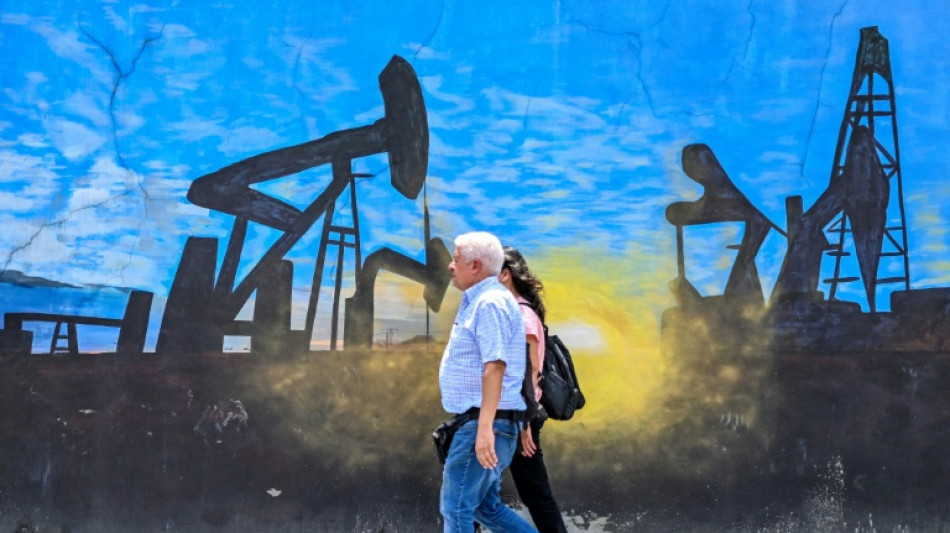
-
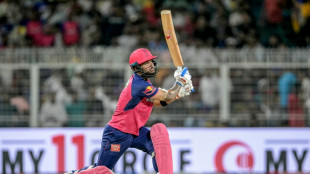 Kolkata survive Parag's six-hitting blitz to clinch IPL thriller
Kolkata survive Parag's six-hitting blitz to clinch IPL thriller
-
Israel vows retaliation against Yemen's Huthis over airport attack
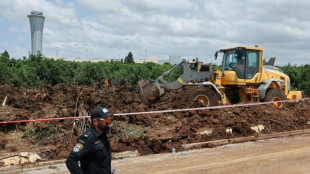
-
 Mbappe maintains Real Madrid Liga dream in Celta thriller
Mbappe maintains Real Madrid Liga dream in Celta thriller
-
UNESCO says Nicaragua quitting over press prize award
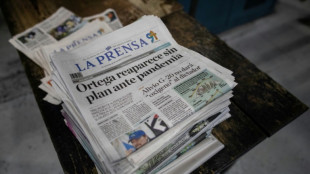
-
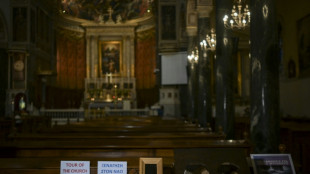 Church donation box goes digital in Greece
Church donation box goes digital in Greece
-
Germans mark liberation of Ravensbrueck Nazi camp
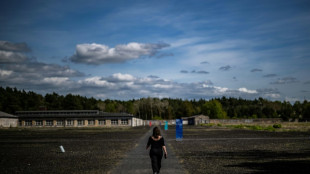
-
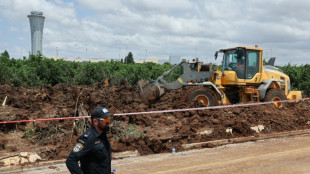 Missile hits Israel airport area in Huthi-claimed attack
Missile hits Israel airport area in Huthi-claimed attack
-
DeChambeau eyes PGA Championship battle after South Korea LIV win

-
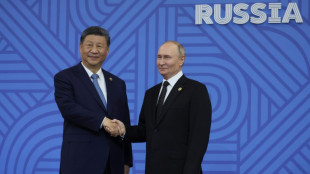 Chinese president to visit Russia on May 7-10: Kremlin
Chinese president to visit Russia on May 7-10: Kremlin
-
'We don't care': weddings go on in Pakistan's Kashmir border

-
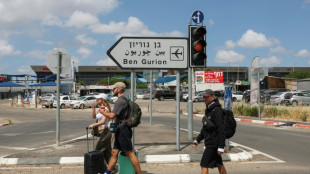 Missile hits Israel airport area in attack claimed by Yemen's Huthis
Missile hits Israel airport area in attack claimed by Yemen's Huthis
-
Mexican mayor arrested in probe of alleged drug cartel ranch: govt source
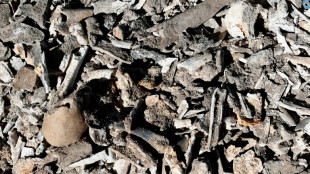
-
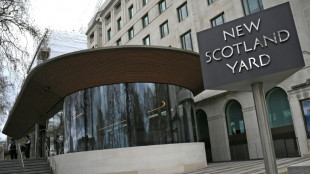 Seven Iranians among eight arrested in UK counterterrorism probes
Seven Iranians among eight arrested in UK counterterrorism probes
-
Israel says area of airport hit after Yemen missile launch
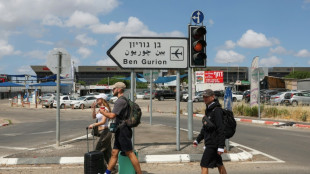
-
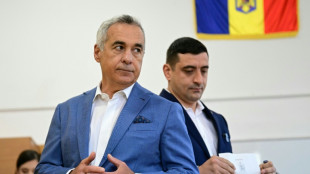 Romanians return to polls as far right hopes to win presidential rerun
Romanians return to polls as far right hopes to win presidential rerun
-
4 Iranians among 5 arrested in UK for 'terrorism offences': police
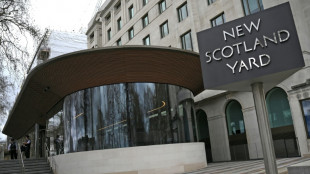
-
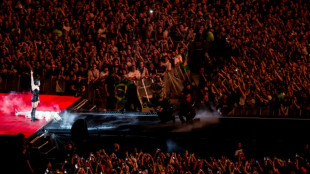 'Two million' throng Lady Gaga concert at Rio's Copacabana
'Two million' throng Lady Gaga concert at Rio's Copacabana
-
India-Pakistan gunfire triggers terror of past conflict
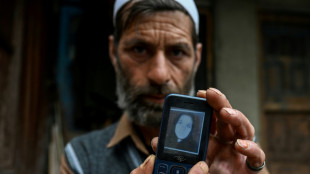
-
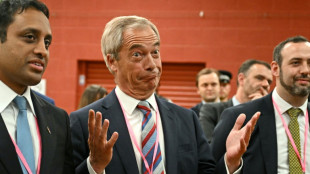 UK hard right sets sights high after local election triumphs
UK hard right sets sights high after local election triumphs
-
Sexual abuse of nuns: one of the Catholic Church's last taboos
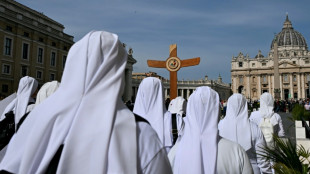
-
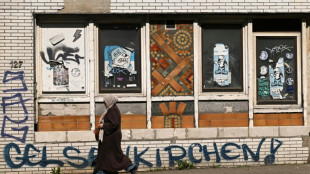 West German foothold of far-right AfD shows challenge for Merz
West German foothold of far-right AfD shows challenge for Merz
-
Maldives president holds record 15-hour press conference
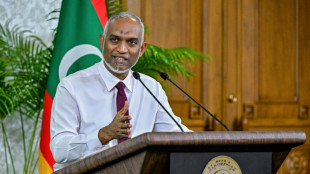
-
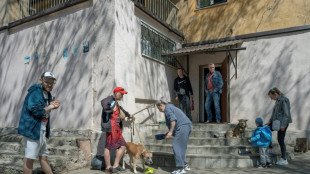 'Accept me': Near Ukraine front, a haven for outcasts
'Accept me': Near Ukraine front, a haven for outcasts
-
Canelo Alvarez unifies super middleweight titles on Saudi Arabia debut
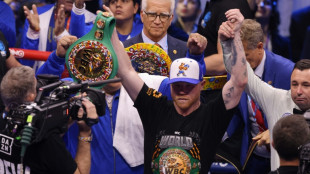
-
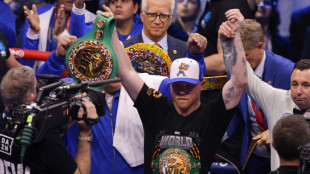 Canelo Alvarez unifes super middleweight titles on Saudi Arabia debut
Canelo Alvarez unifes super middleweight titles on Saudi Arabia debut
-
US Fed expected to pause cuts again and wait for clarity on tariffs
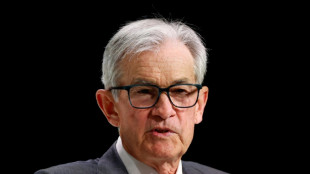
-
 Ex-Liverpool star Firmino 'proud' after more Champions League history
Ex-Liverpool star Firmino 'proud' after more Champions League history
-
Australian PM basks in win, vows 'orderly' government

-
 Qataris hooked on traditional fishing competition
Qataris hooked on traditional fishing competition
-
Mozart chocolate row leaves bitter taste in Austria
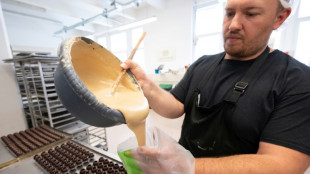
-
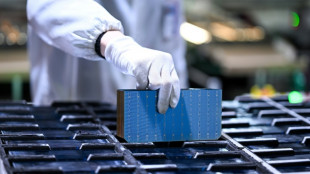 US solar tariffs could drive Asia transition boom
US solar tariffs could drive Asia transition boom
-
Four-try Hurricane Sullivan says revenge fuelled Chiefs upset

-
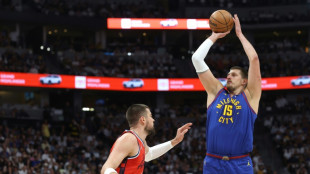 Nuggets rout Clippers to advance in NBA playoffs
Nuggets rout Clippers to advance in NBA playoffs
-
Scheffler shines in dark for eight-shot CJ Cup Byron Nelson lead

-
 Romania returns to polls after annulled presidential vote
Romania returns to polls after annulled presidential vote
-
Easy vote turns Musk's dreams for Starbase city in Texas into reality
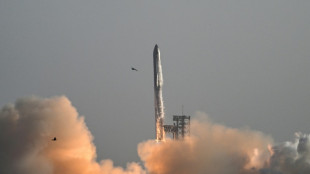
-
 Messi and Miami bounce back with 4-1 crushing of Red Bulls
Messi and Miami bounce back with 4-1 crushing of Red Bulls
-
US researchers seek to legitimize AI mental health care

-
 Ryu clings to two-shot lead at LPGA Black Desert Championship
Ryu clings to two-shot lead at LPGA Black Desert Championship
-
Ledecky, Walsh cap Pro Swim meet with world records

-
 Sovereignty rules in 151st Kentucky Derby
Sovereignty rules in 151st Kentucky Derby
-
Prometheus Laboratories Presents Novel Data on Precision-Guided Care in IBD at DDW(R) 2025

-
 McLaughlin-Levrone sets world's fastest of year in 400m hurdles
McLaughlin-Levrone sets world's fastest of year in 400m hurdles
-
Sovereignty wins 151st Kentucky Derby

-
 US swim star Ledecky smashes her longstanding 800m freestyle world record
US swim star Ledecky smashes her longstanding 800m freestyle world record
-
Antonelli's teenage pace impresses Verstappen

-
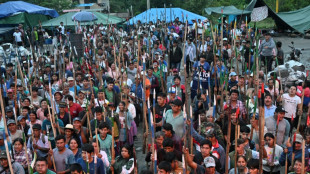 From stronghold guarded by backers, Bolivia ex-leader plots return
From stronghold guarded by backers, Bolivia ex-leader plots return
-
Barca stay on Liga title track with Valladolid comeback

-
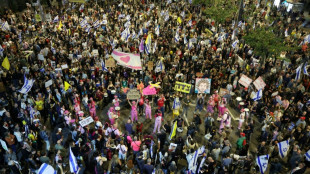 Israel calls up tens of thousands of reservists for Gaza offensive
Israel calls up tens of thousands of reservists for Gaza offensive
-
Verstappen takes pole position for Miami Grand Prix


What next for Venezuela as Trump goes after oil revenues?
President Donald Trump has revoked the licenses that allowed several transnational oil and gas companies to operate in Venezuela despite the country being under US sanctions.
After US energy giant Chevron, Washington has ordered a handful of other energy firms, including Spain's Repsol and France's Maurel & Prom, to cease operating in Venezuela.
Trump, who is seeking to force out authoritarian President Nicolas Maduro, has also announced plans for 25 percent tariffs on imports from any country buying Venezuelan oil and gas.
What's next for the struggling Caribbean country, which has the world's largest-known oil reserves but has become increasingly isolated since July 2024 elections that President Nicolas Maduro is accused of stealing?
- Will the oil stop flowing? -
In 2019, during his first term in office, Trump imposed an embargo on Venezuelan oil in response to 2018 elections that were already marred by fraud allegations.
Venezuela's state-owned PDVSA oil giant was in freefall at the time, beset by corruption scandals, mismanagement and a crippling lack of investment.
Oil output buckled under the weight of the sanctions, falling from around three million barrels per day at the start of the 2000s to below 400,000 b/d in 2020.
The sector recovered some ground after former US president Joe Biden in 2022 eased the sanctions in return for a promise by Maduro to allow fair elections.
Biden later reimposed most sanctions when it became clear that Maduro was not keeping his side of the bargain, but allowed Chevron to continue operations.
Today, Venezuela produces around 900,000 barrels per day of which Chevron contributes about 220,000, Repsol about 60,000, and Maurel & Prom between 20,000 and 25,000.
Washington has given Chevron and the other companies until May 27 to wind up their operations.
"PDVSA ...now has some operational capacity, although we don't know how big it is," Gilberto Morillo, PDVSA's former financial manager told AFP.
- Who will buy it? -
Even if PDVSA manages to keep pumping oil, finding a way to monetize it "is another matter," Morillo said, pointing to the threatened 25-percent US tariffs on countries that buy its crude.
In February, Venezuela exported approximately 500,000 barrels per day to China, 240,000 to the United States, and 70,000 to India and Spain.
In the past, sanctions forced PDVSA to discount the oil and to find partners to circumvent the sanctions.
Caracas also attempted to trade crude oil through a cryptocurrency scheme, which ended with then oil minister Tareck El Aissami being jailed for corruption in a case that cost the country more than $15 billion, according to media reports.
- What impact for the economy? -
The situation looks set to pile further misery on an economy already in tatters.
The price of dollars has soared on the black market as Venezuelans fear falling oil revenue will trigger another bout of hyperinflation and a return to the kind of deep recession the country experienced between 2014 and 2021.
The forced pullout of gas producers could also have an impact on the country's crumbling energy infrastructure, leading to more blackouts.
Repsol pointed out that 85 percent of its operations in Venezuela were related to the production of natural gas, which it warned "supports part of the electricity network."
The cancellation of the licenses will prevent PDVSA from using oil to pay the foreign energy companies for gas, as it had been doing, Morillo explained.
"If PDVSA can't pay them, then it generates a debt," he said.
But if the energy firms decide "ok, we'll close down and leave...they would lose their entire investment," he argued.
L.Davis--AMWN